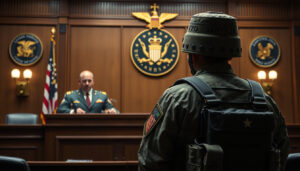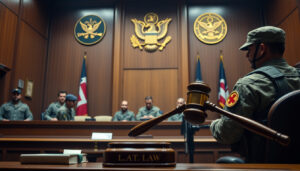As a military servicemember, the stakes are high when faced with legal challenges. A single misstep can mean the difference between a successful career and a swift discharge, impacting not just your life but that of your family too. In fact, according to the Department of Defense, over 1,000 servicemembers are court-martialed every year, highlighting the urgency of understanding and navigating the Uniform Code of Military Justice (UCMJ). This is especially true for those facing criminal allegations or administrative actions that could endanger their service and reputations.
In this comprehensive guide, we will explore the legal landscape pertaining to UCMJ, discuss how you can protect your military career, and provide steps to take if you find yourself in a precarious legal situation.
Understanding the UCMJ: The Basics
The UCMJ is a federal law that outlines the criminal offenses and procedures applicable to members of the armed forces. It applies to all active-duty, reserve, and National Guard servicemembers and includes serious charges, such as sexual assault and misconduct, as well as punishment procedures like non-judicial punishment (NJP).
If you’re facing allegations under the UCMJ, it’s crucial to seek a military defense lawyer with experience in court-martial situations. Your legal representation will be critical in navigating these challenges.
What to Expect from a UCMJ Proceeding
- Investigation Phase: You may be subjected to a command-directed investigation or an investigation by agencies like the CID (Criminal Investigation Command).
- Charges Filed: After an investigation, charges may be filed against you, which can lead to a NJP under Article 15 or formal charges that warrant a court-martial.
- Court-Martial Options: Depending on the severity of the charges, you may have options for a summary court-martial, special court-martial, or general court-martial.
- Possible Punishment: Consequences may include loss of rank, fines, confinement, or a discharge from service.
Common Legal Issues Under UCMJ
1. Sexual Assault Allegations (Article 120 UCMJ)
Sexual assault charges, especially those under Article 120 of the UCMJ, are particularly serious and can have life-altering consequences. It’s essential to understand your rights and the legal definitions within this article, as misunderstandings can lead to wrongful accusations.
- Defensive Strategies: If you find yourself facing such allegations, consult with a civilian defense lawyer who specializes in Article 120 cases. They can help gather evidence, prepare your defense, and represent you in court-martial.
2. Non-Judicial Punishment (NJP)
Non-judicial punishment is often a first step for military authorities when dealing with minor offenses. Under Article 15, commanding officers can impose disciplinary actions without a formal court-martial.
- Rights Under NJP: Servicemembers have the right to refuse NJP and request a court-martial, which can sometimes benefit your case. An experienced military attorney can explain these options better.
3. General Officer Memorandum of Reprimand (GOMOR)
A GOMOR is a type of administrative action that can impact your career if not handled properly. A GOMOR can lead to an adverse action against you, such as being passed over for promotion or even administrative separation.
- Rebuttal Strategies: You have the right to rebut a GOMOR before it becomes a part of your record. Get your defense team involved to ensure your perspective is clearly presented.
What to Do if Under Investigation
Being under investigation can create a whirlwind of emotions, concern, and uncertainty. Follow these steps to protect your rights and minimize the impact on your life and career.
Step 1: Consult with a Military Defense Lawyer
One of the most crucial steps after learning you’re under investigation is consulting with a civilian military defense lawyer. Look for attorneys specializing in military law who have a proven track record in handling cases similar to yours. They can provide expert advice on how to navigate the legal proceedings effectively.
Step 2: Gather Documentation
Collect any relevant documentation or evidence that may help your case. This includes emails, communication with witnesses, and notes from meetings related to the case. Your attorney can guide you on the importance of these materials.
Step 3: Remain Professional
Maintain professionalism in your duties and interactions. Avoid discussing the case with others, as this can complicate your situation and possibly create more problems.
Step 4: Be Prepared for Interrogations
If you are detained for questioning, be prepared. Always remember your right to an attorney. Do not provide a statement or engage in discussions about the allegations without your court martial attorneys present.
Frequently Asked Questions
What Should I Look for in a Military Defense Lawyer?
- Experience: Choose a lawyer with extensive experience in military law and a solid record in fighting UCMJ cases.
- Reputation: Research reviews or testimonials from former clients.
- Communication Skills: Make sure they communicate clearly and can explain complex legal terms in a way you can easily understand.
How Can I Challenge False Accusations?
- Collect Evidence: Gather any evidence that disproves the charges or supports your version of events.
- Witness Testimony: Identify witnesses who can vouch for your character or provide corroboration of your account.
What’s the Difference Between NJP and Court-Martial?
- NJP: Generally for minor offenses that don’t require a formal trial; involves less severe penalties.
- Court-Martial: A more formal legal process for serious offenses that can result in significant penalties or a criminal record.
Conclusion
Facing UCMJ allegations or administrative actions can be overwhelming. However, understanding your rights and knowing the steps to take can significantly alleviate some of the stress and uncertainty associated with these situations. Having a qualified military defense lawyer by your side can make all the difference, protecting not just your career, but your reputation and future.
Call to Action
If you or a loved one are facing legal issues in the military, contact Gonzalez & Waddington, Civilian Military Defense Lawyers, at 1-800-921-8607 for a free consultation. Our experienced team represents servicemembers worldwide.
For further reference, you might review these authoritative military regulations:
Taking the proactive approach you need will enhance your chances of overcoming legal tribulations and returning to your critical role in the armed forces. Remember, the sooner you act, the better prepared you will be to fight for your future.
Related Posts
- Video: Hickam AFB Military Defense Lawyers – Hawaii Court Martial Attorneys – Article 120 UCMJ Law Firm
- Video: Borderline Personality Disorder (BPD) & False Allegations – Broward County Criminal Defense Lawyers
- Video: Tampa Military Defense Lawyers – Florida Court Martial Attorneys – Article 120 UCMJ
- What to Know About Obeying an Unlawful Military Order – What is a Lawful Order UCMJ



